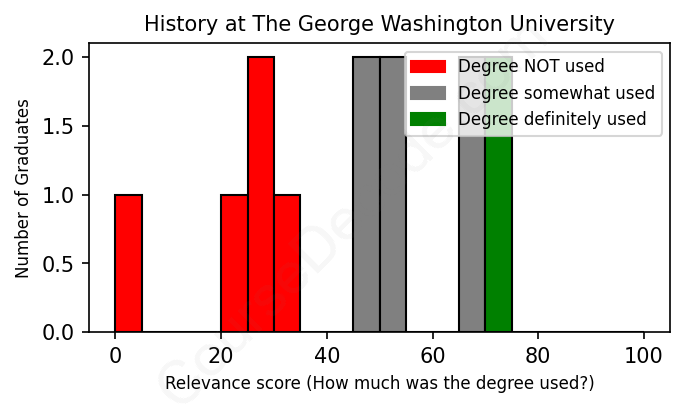
First, some facts. Of the History graduates from The George Washington University we've analyzed , here's how many have used (or NOT used) their degree in their career:

These are estimates based on AI analysis of 13 LinkedIn profiles (see below).
The verdict? Bad. Overall, with an average relevance score of 44%, History graduates from The George Washington University have a substantially lower likelihood (-23%) of finding work in this field compared to the average graduate across all fields:
And for comparison, here's the chart for all profiles we've looked at across all degrees.
Also, after graduating, 53% of these graduates have pursued further education other than another Bachelor's degree (such as a Masters degree or other), compared to the average across all profiles of 35%. This suggests you may need more than just a Bachelors degree to be competitive as a History graduate.
See the details:
|
Relevance score: 0% We think this person has NOT gone into a career related to their degree. We think this person has NOT gone into a career related to their degree.
DEGREE INFOGraduated in 2016 from The George Washington University with a Bachelor of Arts (B.A.) in History. No other secondary education since. JOB HISTORY SINCE GRADUATIONDigital Marketing Intern Americans for Prosperity Jun 2016 - Aug 2016 Junior Partner  27 Chapel Street, LLC Jun 2017 - Present Junior Partner  102 Ashley Avenue, LLC Dec 2017 - Present Junior Partner  12 Elizabeth Street, LLC Aug 2021 - Present ABOUTNo information provided. |
The top 10 most common jobs done by the graduates we've analyzed (ranked most common to least) are:
Here is a visual representation of the most common words in job titles for History graduates (this is across all History graduates we've analyzed, not just those who went to The George Washington University):

When you look at the career paths of graduates with a degree in History from The George Washington University, it’s clear that there’s a real mix of trajectories. Right after graduation, many students seem to land roles that leverage some of the skills they honed during their studies, like research, analysis, and communication. For instance, some start as interns in legal settings or take roles in education, like teaching or policy research. However, not everyone sticks closely to history-related jobs; some go off in different directions, like managing a bar or running a pet services business. This variety suggests that a History degree opens up several avenues but doesn't lead everyone directly to a history-focused career.
Fast forward five to ten years later, and you start to see more distinct patterns. Some grads find themselves in solid roles tied to law and policy, which aligns nicely with their critical thinking skills developed in their History programs. Others seem to drift away from history, indulging in entrepreneurship or working in more general business roles. It's a bit of a mixed bag when you think about long-term career success; while some grads secure positions that definitely utilize their history backgrounds, others appear to have taken jobs that are less relevant to their degrees. So, it definitely seems like a History major can lead to diverse opportunities, but it may not guarantee that they’ll stick to that specific field for life.
Honestly, getting a Bachelor’s degree in History at The George Washington University can be pretty challenging, but it really depends on your interests and study habits. GW is known for its rigorous academics, so you’ll definitely be diving into a lot of readings, research papers, and discussions about historical events and their significance. If you love digging into the past and don’t mind writing essays, you might find it rewarding; if not, it could feel a bit overwhelming. Generally speaking, a History degree isn’t considered the easiest, but it also isn’t as hardcore as some STEM programs. Just be prepared to commit some serious time to studying and staying engaged with the material!
Most commonly, in the LinkedIn profiles we've looked at, it takes people 4 years to finish a Bachelor degree in History.
Looking at this lineup of GWU History grads, it seems like they’ve got a mixed bag when it comes to cash flow. Some have jumped into pretty respectable careers—especially those who went into law or government positions—where salaries tend to be on the higher end, like the graduates working at Harvard or various legal firms, which usually means they've found decent-paying gigs. Others, like the pet service owners or those in teaching positions, might not be raking in the big bucks, especially in the beginning. Overall, it looks like if you’ve landed a solid role in law or high-level admin, you’re probably doing alright, but some of them still might be hustling a bit more to make ends meet. So, it’s kind of a hit or miss depending on the path they chose!
Here is a visual representation of the most common words seen in the "about" section of LinkedIn profiles who have a Bachelor degree in History (this is across all History graduates we've analyzed, not just those who went to The George Washington University). This may or may not be useful:

Here are all colleges offering a Bachelor degree in History (ordered by the average relevance score of their History graduates, best to worst) where we have analyzed at least 10 of their graduates: